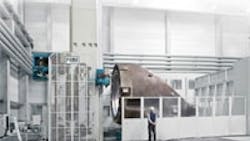Like many other countries, Italy's machine tool industry has experienced significant drops in machine orders, from both traditional and emerging markets, for most of 2009. However, the end of 2009 looks a tad better, with an ever-so-slight uptick in machine orders expected. Still, the level of orders is predicted to remain well below normal for the start of 2010.
During a recent press conference at EMO, the European manufacturing tradeshow held this year in Milan, Dr. Giancarlo Losma, president of UCIMU, the Italian Machine Tool, Robots and Automation Manufacturers' Association, discussed a few actions that could help to jump start the machine tool industry. Of those, he suggested that there has to be a "harmonization" of economic actions between all European Union countries. On the Italian front, he called for a government sponsored machine-scrapping program, the motivation being that over 20% of machine tools in Italy are more than 20 years old. This program is actually being considered by the Italian government.
See Also |
Italy's machine tool industry is quite fragmented, and most of its machine tool builders are small to medium-size family-owned companies. Their average employment total is only 50 people, as compared with, say, large German builders with average labor forces of 200 employees.
Being smaller and family owned has its benefits. Italian builders are agile and can quickly respond to changing customer needs. They are also reactive in terms of research and development and investing in technology to remain competitive on a global level. Going global is keeping the Italian machine tool industry strong.
Italian machine tool builders such as Pama are surviving by meeting the needs of large-part machining.
Batisti added that different markets, countries and sectors within those countries can have different machine and part surface specifications. He mentioned on market trend that has many Italian builders cashing in: is the surge in large part machining, especially within the energy (wind power), oil and gas, aerospace, and ship building.
Pama specializes in big boring and milling machines, both table and floor types. Most are standard machines but with special components matched specifically to certain markets and customers. For example, the company's Speedram series of machines can be built with vertical strokes from 6.56 ft. to as high as 26.25 ft.
For Colgar SpA (www.colgar.it), another family-owned machine tool builder, going global and specializing in large machines has allowed it to survive in a bad economy. The company continues to invest in its product line by developing machines that will expand its exports business.
"We need to keep developing machines to handle bigger and bigger parts, which is completely customer-driven. On the plus side, there's less competition in building large machine tools. There's maybe 10 worldwide," explained Alberto Vigano of Colgar.
One of Colgar's latest machines is a traveling-column gantry machine with a 16.40-ft.-cube working capability and a 5-axis head for both hard and soft materials. It's a rigid machine that combines power for hard materials and speed for the softer ones. Plus, some of company's gantry machines can include a turning table for both turning and milling parts on one machine.
"Customers try to concentrate their investments in one machine with more capabilities. They want to be able to work on every type of component with that one machine. The philosophy of different machines for different part types and materials is no longer in practice," said Vigano.
Gruppo Riello Sistemi, among other Italian machine tool builders, believes today's machine tools must be multifunctional and handle both hard and soft materials.
Jobs' latest innovation comes as part of its Linx series of machines. This newest Linx model, according to Fernanda Tesolin of Jobs, is the first linear motor-driven machine that can both mill and turn parts.
The machine's work area is equipped with a standard fixed table together with a rotating one for turning part diameters up to 13.12 ft. Shops that can mill and turn on one machine eliminate the need for two separate machines.
Breton Spa (www.breton.it) is another Italian machine tool builder offering a machine with multiple functionality. The company's new Maxima not only turns and mills, but also can grind parts. Its maximum turning diameter measures to 11.48 ft, and it handles part lengths to 26.25 ft. and longer.
Two other Italian machine tool builders meeting customer demands for large-part machining are Gruppo Riello Sistemi (www.riellosistemi.it) and Pietro Carnaghi SpA. (www.pietrocarnaghi.it). From Gruppo Riello Sistemi comes the company's Mandelli brand Spark 2600X with a reversed T structure and Z-axis movement on its table and X-axis movement on its column. Designed for cutting both hard and soft materials, the Spark 2600X accommodates components measuring 8.53 ft. in diameter.
Jobs, an Italian machine tool builder, specializes in incorporating linear motor technology into large-format machine tools.
